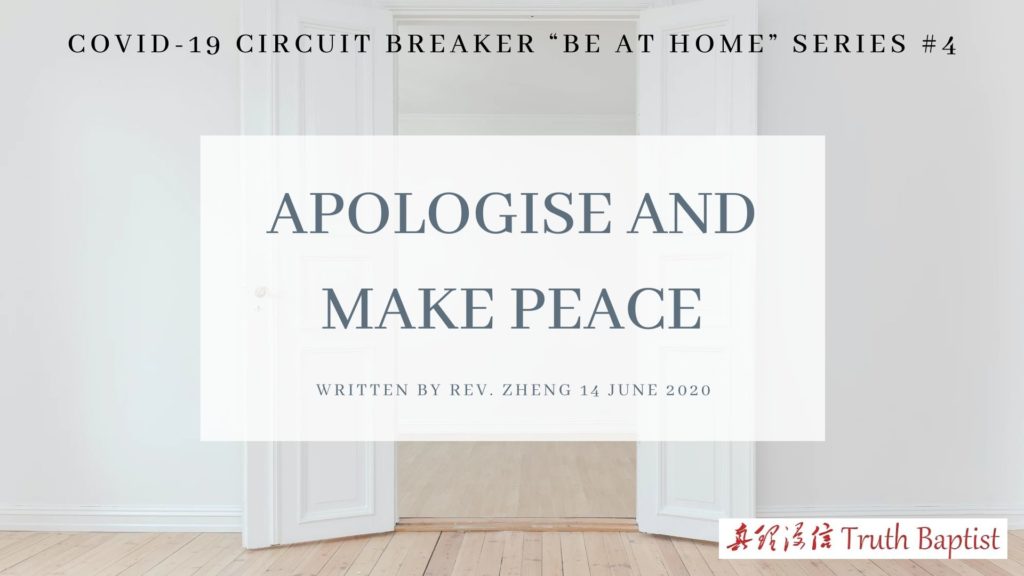
Written by Rev. Zheng 14 June 2020
The boy Jesus said to his parents, “Didn’t you know I had to be in my Father’s house? “ or “I must be about My Father’s business?” (Luke 2:49). To be at home here means to concern yourself with your household. In the Life Bible Study this month, we have come together to learn to lead our family to live in unity, to fill our home with God’s love and to make our home a testimony of the Gospel of Jesus Christ during the Circuit Breaker period.
The life story of Jacob the patriarch is recorded in chapter 25 to 35 of Genesis. Jacob was the second son of Isaac. The name ‘Jacob’ means ‘grasp’, as he was born with his hand grasping his twin brother’s heel. Jacob was chosen by God to inherit the promise of Abraham before he was born. God declared to his parents that “the older will serve the younger” (Ge 25:22), which means that Jacob will receive the birth right of the Esau.
Perhaps due to this prophesy and influence from his mother who held Jacob close to her heart, Jacob longed for the spiritual blessing that was promised to him, so much so that he did not wait to be given but grabbed it through deception. He first seized the opportunity and exchanged for Esau’s birth right with a bowl of red soup, then he took advantage of Isaac’s blindness, disguised as Esau and received the patriarchal blessing for the firstborn from his aged father (25:31-34, 27:29).
Esau hated Jacob because of this and wanted to kill him, “The days of mourning for my father are approaching; then I will kill my brother Jacob.” (27:41)
To avoid bloodshed in the family, Jacob had to leave home and take refuge with his uncle in Haran. He thought it should not take long for Esau’s anger to subside, not knowing that he would spend twenty of his prime years outside the very land of promise that he tried to grasp.
Twenty years later Jacob returned to Canaan with his entire household and properties under God’s instruction. However, he did not forget that there was someone who wanted to take his life back here. Jacob knew that he had to make peace with Esau before he could settle his household safely. The first thing he planned to do was to go to Esau and ask for reconciliation.
Take initiative in reconciliation
Knowing the possible danger facing him and his family, Jacob sent an advance squad to Esau to find out Esau’s attitude towards his return, he carefully instructed them the exact words to say to his brother,
“Thus you shall say to my lord Esau: Thus says your servant Jacob, ‘I have sojourned with Laban and stayed until now. I have oxen, donkeys, flocks, male servants, and female servants. I have sent to tell my lord, in order that I may find favor in your sight.’” (Ge 32:3-5)
Jacob was basically saying to Esau, “It was never my intent to make Haran my home. Here I am now, with sufficient wealth to live on my own. However I wish to have your blessing and to live in peace with you.”
Children of God are to seek peace with one another in the church, and he who takes initiative to do so earn additional points in his spiritual report card.
Seek Help from God
How did Esau respond to Jacob’s return?
“And the messengers returned to Jacob, saying, “We came to your brother Esau, and he is coming to meet you, and there are four hundred men with him.” Then Jacob was greatly afraid and distressed. (Ge 32:6,7a)
Esau has apparently developed from a strong hunter’s household to a people with military power. Jacob had no idea whether Esau was coming in peace or to wage war. But a troop of four hundred men was very intimidating. In great distress Jacob contemplated whether to flee or to meet his brother. It was hard to decide, but Jacob did the right thing: asked the God who brought him to Canaan for help.
Please deliver me from the hand of my brother, from the hand of Esau, for I fear him, that he may come and attack me, the mothers with the children. (25:11)
Most of the time we are not able to fully emphasize people’s feeling and thoughts. That is why we need God’s help whenever we need to seek reconciliation. God will help us, because it is He who calls us to peace (1Cor 7:15). No matter how great a man’s hatred is God can dissolve it, because “the king’s heart is a stream of water in the hand of the LORD; he turns it wherever he will.” (Prov 21:1)
When you are surrounded by hostility remember to ask your God for help.
Make Generous Restitution
After praying, Jacob decided not to flee but to express his sincere apology to Esau by sending lavish gifts in advance of their meeting.
“13 So he stayed there that night, and from what he had with him he took a present for his brother Esau, 14 two hundred female goats and twenty male goats, two hundred ewes and twenty rams, 15 thirty milking camels and their calves, forty cows and ten bulls, twenty female donkeys and ten male donkeys. 16 These he handed over to his servants, every drove by itself, and said to his servants, “Pass on ahead of me and put a space between drove and drove.” 17 He instructed the first, “When Esau my brother meets you and asks you, ‘To whom do you belong? Where are you going? And whose are these ahead of you?’ 18 then you shall say, ‘They belong to your servant Jacob. They are a present sent to my lord Esau. And moreover, he is behind us.’” (Ge 32:13-18)
By sending one gift after another, Jacob hoped to dissolve any hatred residue in Esau. Jacob’s thought was in line with God who ordained that the guilt offering should be accomplished by making restitution to compensate for the loss of the offended.
Neither gift or compensation can replace apology, but they can convey your sincerity and remorse, and hence comfort a hurting heart.

Humbly Ask for Forgiveness
After sending the gifts, Jacob knew that he had yet to take one crucial act, which is to admit his transgression and to ask Esau for his forgiveness.
“And Jacob lifted up his eyes and looked, and behold, Esau was coming, and four hundred men with him. So he divided the children among Leah and Rachel and the two female servants. 2 And he put the servants with their children in front, then Leah with her children, and Rachel and Joseph last of all. 3 He himself went on before them, bowing himself to the ground seven times, until he came near to his brother. (Ge 33:1-4)
We can imagine everyone in Jacob’s household was holding their breath to see what happened. Jacob walked towards Esau and his troop by himself in front of his wives and children. As he walked, he bowed to the ground. He did it seven times, as seven signifies ‘complete’ in Hebrew culture, Jacob’s action alluded to him taking full responsibility for the animosity between them. There was no ‘but’ or ‘you too are at fault’ on his mind or tongue. What was even more admirable of Jacob was that he did this before the eyes of his wives, children and servants!
Jacob was able to do this because of transformative experience the night before at Penuel (32:24-32). God came and wrestled with him, making him realize that he has been wrestling with God all his life, refusing to follow God’s way and God’s timing! With this enlightenment, Jacob saw how he had short-changed his father and brother. From a remorse and broken spirit out came true humility. Jacob was renewed.
May every encounter with God be renewing and transformative to us, that we too have the strength to apologise in full humility.
Children of God Ought to Take Initiative to Make Reconciliation
To live harmoniously with the family is the duty of every man, especially for Christians as we know the truth that family is God’s gift for us. If we offend our family members, we ought to take initiative to apologise and make reconciliation. Even when we are the one offended, we should also do so, for this is the teaching of the Lord Jesus,
So if you are offering your gift at the altar and there remember that your brother has something against you, 24 leave your gift there before the altar and go. First be reconciled to your brother, and then come and offer your gift. (Mat 5:23,24)
The Lord Jesus tells us that our heavenly Father does not desire disharmony in His church. Without making effort to reconcile, whether you are the offender or offended, your worship will not be accepted. God expects us to actively make peace with one another by apologising and forgiving. In other words, if I come to realize my transgression, I have to sincerely admit it and ask for forgiveness, even if the other person has not realized his transgression. As Paul said, “Who are you to pass judgment on the servant of another? It is before his own master that he stands or falls. And he will be upheld, for the Lord is able to make him stand.” (Ro 14:4)
The ability to make peace is a sign of spiritual maturity
The Divine Example
When we reflect on how we turned from being the son of wrath to the son of God, we realized that it is God who took the initiatives, both for an individual sinner and for mankind as a fallen whole. Before the creation of the world and before man turned against God, God has already made plan for our salvation! He came into the dying world to die for our sins without we asking for it, and He seeks every soul that belongs to Him without waiting for us to seek him.
“not that we have loved God but that he first loved us” (1John 4:10)
The Highest, Holiest and Greatest God took initiative to reconcile the lowly and unworthy sinners to Him, how could we so undeserving refuse to take initiative to reconcile with others? Children of God are called the peace makers, why are we hesitate to apologise or to forgive? Without reconciliation, we will be bound by hatred and guilt. Thanks be to God, we can break this bondage by the grace and mercy of the Lord Jesus Christ.
Closing
Jacob prayed to God for help, took initiative to make peace with Esau, showed his sincerity by sending Esau generous gifts and apologised in humility. Did Esau accept him?
But Esau ran to meet him and embraced him and fell on his neck and kissed him, and they wept. (33:4)
Thanks be to God! A breath-holding scene turned into a scene of weeping joy. The angelic spectators praise God for the obedient and righteous acts of His child!
Dear brothers and sisters, taking initiative to seek reconciliation, praying to God for help, asking for forgiveness humbly and making restitution generously are the four keys to obtain forgiveness. Do not misplace them!


0 Comments